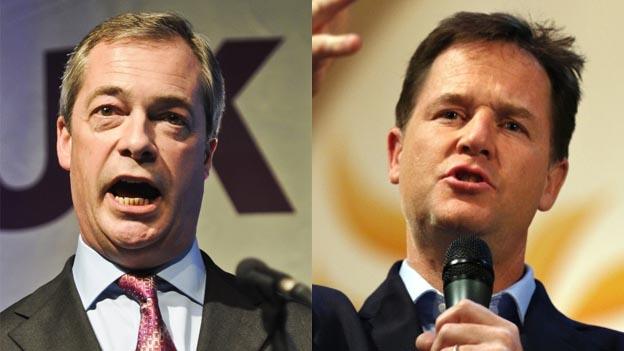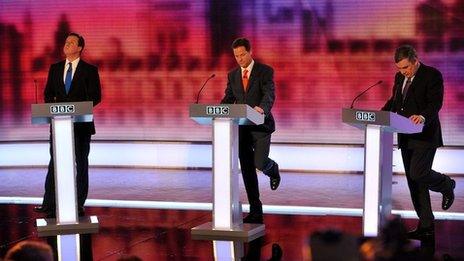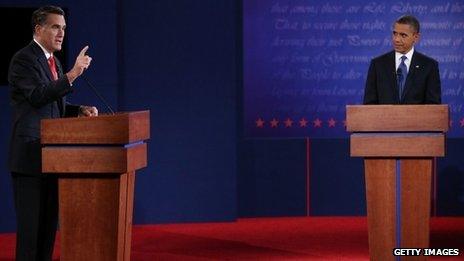BBC to host Nick Clegg and Nigel Farage TV debate
- Published
- comments

Nick Clegg and Nigel Farage are to go head-to-head on BBC television in a debate on Britain's future in Europe.
The hour-long debate will be shown on BBC2 from 7pm on Wednesday, 2 April, and will be hosted by David Dimbleby.
Mr Clegg's Liberal Democrats are the most pro-EU of the main parties at Westminster, while Mr Farage's UKIP advocates withdrawing from the EU.
They have been involved in a growing spat over the issue, ahead of May's European elections.
Last month, Mr Farage accepted Mr Clegg's invitation to a televised "open debate" on whether the UK should stay in the EU.
'Fantastic opportunity'
The BBC said the televised debate would take place in front of an audience "selected by a reputable polling organisation to be demographically representative and with an equal number of people for and against British membership of the EU". Questions will come from the audience members.
James Harding, Director of BBC News and Current Affairs, said: "We are delighted to have negotiated successfully to broadcast this important debate. Europe is always a highly charged issue in British politics and this is a fantastic opportunity to test the arguments."
Mr Clegg last month challenged the UKIP leader to a debate on his weekly phone-in programme on LBC radio, which will also host a clash between the two party leaders.
He said: "I will challenge Nigel Farage to a public, open debate about whether we should be in or out of the EU, because that is now the choice facing this country and he is the leader of the party of 'out'; I am the leader of the party of 'in'.
"I think it's time we now have a proper, public debate so that the public can listen to the two sides of the argument and judge from themselves."
'Needy for publicity'
In response, Mr Farage said he wanted the Conservative and Labour leaders to join in a four-man debate, which he suggested should take place during the European election campaign in April or May.
But he said he would take on the Lib Dem leader in a head-to-head debate even if the other party leaders declined.

The party leaders took part in a general election TV debate for the first time in 2010
Downing Street said David Cameron will not be taking part in the debate with Mr Farage and Mr Clegg.
A spokesman said the prime minister would be setting out his views on Europe during the European election campaign and did not want to start "another process", adding the Lib Dems were "a bit needy of publicity".
The Labour Party said the party's priority was to reach agreement on TV debates between the two prospective prime ministers ahead of the next election.
"Anything else will be a matter for negotiation after that is agreed," he added.
Leaders debates have long been a feature of election campaigns in the United States, but took place for the first time in Britain at the 2010 general election.
But there is some doubt over whether the exercise will be repeated in 2015, amid behind-the-scenes wrangling over the likely format and timing of the programmes and battles about who should be allowed to take part.
'Quite wrong'
The BBC's chief political correspondent Norman Smith said the debate between Mr Clegg and Mr Farage could encourage the party leaders to sign up to general election debates or, alternatively, "provide some room to argue against them".
UKIP is consistently ahead of the Lib Dems in national opinion polls, with Mr Farage claiming his party is in with a chance of topping the polls at the European elections.
The Liberal Democrat party president Tim Farron, by contrast, is warning his party it faces the "fight of their lives" to retain its 12 MEPs.

Republican candidate Mitt Romney clashed with Barack Obama in 2012
Mr Clegg, who has known Mr Farage since his days as an MEP, between 1999 and 2004, has opted to launch an all out attack on his Eurosceptic rivals, focusing on their voting record in Brussels and Strasbourg.
In a speech on the EU's role to the Centre for European Reform, Mr Clegg accused Mr Farage and his colleagues of failing to "stand up for Britain" in the European Parliament.
"Nigel Farage and deputy leader Paul Nuttall rarely turn up to vote in the European Parliament, despite being happy to take their taxpayer-funded salaries," he said.
"UKIP MEPs refuse to roll up their sleeves and get down to work. Nigel Farage hasn't tabled a single amendment to EU legislation since July 2009."
Mr Farage hit back at his rival's claims, saying: "Nick Clegg has some cheek raising attendance and voting records. Although Nick Clegg lives in London, between 2010 and 2014 he has voted in Westminster only 22.6% of the time.
"By contrast I live eight hours away from Strasbourg, lead a national party and have voted 55% of the time in the European Parliament."
He also said that the group of MEPs that he leads, the "Europe of Freedom and Democracy", had "put down hundreds of amendments since 2009, so factually Nick Clegg is quite wrong in what he's saying here".
He said he would use the TV debate with Mr Clegg as a "platform for the majority of British people who want our relationship with Europe to be one of trade and co-operation but not one of political union".
- Published23 February 2014
- Published21 February 2014
- Published20 February 2014
- Published11 February 2014